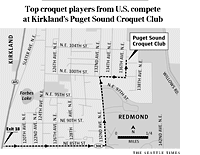Serious croquet contest calls for wicket finesse, not backyard bashing

Gentlemen, it seems, do not bash opponents' croquet balls into the creek. At least not at the National Croquet Championships being played today and tomorrow at the Puget Sound Croquet Club in Kirkland.
For one thing, there's no creek near this laser-leveled, lush grass court that more closely resembles a golf green than a backyard croquet course. For another, six-wicket croquet requires well-practiced mallet skills and strategizing. Bashing an opponent's ball into the hinterlands definitely isn't in the rules of this game.
"Backyard croquet is a pathetic psychology experiment," said Mik Mehas, of West Palm Beach, Fla., a frequent champion who is competing in the tournament, which Kirkland is hosting for the first time. "Backyard rules change to fit the moment. Here, we know the rules. This is more like chess or pool."
Just as outstanding pool or billiards players clear their balls off the table in one run, championship croquet's top players pride themselves on similar skills — sending their balls through all the wickets without allowing the competition a turn.
It isn't easy.
In official competitive croquet — an Olympic sport 100 years ago — balls barely fit through the wickets. If the course is set properly, there won't be enough space to slip a credit card between a wicket and a ball. The balls weigh one pound, and good three-pound mallets cost $300 to $350. The official court is 105 feet by 84 feet.
Croquet can be confusing to watch because, at tournaments, there often will be two different games in progress on the same court. One learns, players said, to pay attention and stay out of the way. To clear the course, each competitor must go through all of the wickets twice; the fastest one through is the winner.
Players dress in white. There's little noise beyond the click of balls. Spectators speak quietly, if at all, on the sidelines. There are no scoreboards announcing which of the 21 players in Kirkland are leading. Winning is more for the glory than for the dollars. A large purse in the croquet world may be $8,000.
"There's no television coverage, no big sponsors," said Don Taves, of Redmond, president of the Kirkland club.
He explained that for beginners, rules can be confusing. Besides backyard croquet, there's the American rules game overseen by the United States Croquet Association, there's international rules for worldwide competition, and a newcomer — a simpler version called golf croquet. The Kirkland club holds weekly free clinics to introduce newcomers to golf croquet.
This week's tournament, a precursor to picking the six-player American team for an upcoming world tournament, follows international rules.
Taves said people don't know how challenging and cerebral croquet can be. He and his adult son, John Taves, of Sammamish, are hooked on the sport. The younger Taves is considered one of the best players in the game. He's a local favorite and expected to win a slot on the American international team.
"John didn't sleep one night because he was thinking about the game," Don Taves said. "He was trying to figure out a way to set up a shot that would hurt his opponent."
Bashing the opponent's ball into the creek seems easier.
For some, such as Jeff Soo, of North Carolina, one of the directors of this weekend's tournament, competitive croquet has staying power.
"I love the game and the community because it has a strong tradition of sportsmanship," he said. "I happen to enjoy things that are a bit off the beaten track, that take some finding, and croquet fits into that."
Locally, competitive croquet has been around for decades. Two former players, Vern Williams, of Bainbridge Island, and Rich White, of Seattle, competed originally on a court near a yacht club in Seattle. They believe competitive croquet in the Northwest goes back to the 1950s. Once there were croquet lawns on the infield at the old Longacres horse racetrack in Renton. In the 1970s or early 1980s, there was a course at the old Lake Washington Shipyards and former Seahawks training camp, where today the Carillon Point office and hotel complex sit.
There are about 300 croquet venues throughout the United States, the majority in Florida and on the East Coast, where for years it was considered an elitist game. Mehas said that's one of the problems with competitive croquet in this country.
"The average age of our players is almost deceased," he said. "Other countries nurture their younger players."
But don't be fooled by the genteel atmosphere of a croquet tournament. Players take the game seriously; some practice every day. It can be cutthroat. Don Taves briefly forgot he was playing international rules, not American ones this week, his opponent didn't remind him and he lost a game because he didn't take a final shot.
Currently, men dominate American competitive croquet. Mehas attributes that to a lack of killer instinct in women. But Marian Smith of Issaquah has another explanation. She just started playing croquet three years ago and said few people, women or men, know about this form of croquet. It needs more press, more public attention, she said.
"It's a nice social game and a chance to meet people if you're looking for a social outlet. You can travel all over the world and compete," she said. "But it's not a no-brainer. You have to use your noggin."
Sherry Grindeland: 206-515-5633 or sgrindeland@seattletimes.com
Croquet player

National Croquet Championships![]()
![]()
Puget Sound Croquet Club: 9 a.m. to 6 p.m. today and tomorrow. Free; spectators are advised to bring chairs. 10229 136th Ave. N.E., Kirkland. Information: www.pugetsoundcroquet.com
Seattle Open Tournament: July 6-10; hosted by Puget Sound Croquet Club.
Free clinics: Learn-to-play clinics 1-3 p.m. Sundays (except during tournaments). Puget Sound Croquet Club.